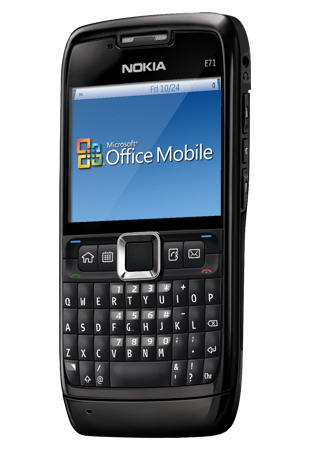The high profile part of the announcement sees an agreement for Microsoft to bring 'Microsoft Office Mobile and Microsoft business communications' to Nokia phones. The Microsoft Office portion will include read and edit versions of Word, Excel, Powerpoint and OneNote. Microsoft's Stephen Olop noted this was a very significant announcement, 'it is the first time Microsoft will develop an Office solution for another smartphone platform'. Currently the Office solution on Nokia phones is provided by Quickoffice, it is currently unclear how the new alliance will affect Nokia's licensing agreements with Quickoffice.
The alliance also includes collaboration on back-end software. For example, the ability to work collaboratively via Microsoft's Sharepoint solution was discussed. Nokia phones will also be integrated into Microsoft System Center, which helps companies manage their IT infrastructure. This includes the ability to deploy and remotely manage Nokia devices as part of an end to end enterprise solution. Both companies expect the collaboration to extend and broaden into other areas over time.
However, long term, the most significant part of the alliance may be the level of future co-operation and collaboration between the two companies. Both Nokia and Microsoft emphasised that this is a long term partnership and that they are most excited about the products that are yet to be created. The two companies intend to work together to create the next generation of communication and productivity tools. A key focus area will be unified communications. The alliance is 'way beyond documents and email... it is about creating new user experiences and new ground breaking soutions' according to Microsoft's Stephen Olop. Kai Öistämö said, 'what we have shared today is not the full extent of the alliance... this is about much more than just putting Microsoft software on Nokia phones. We are here to address the significant opportunity in the enterprise market and will be collaborating on the enterprise tools of tomorrow'.

The slide, from the press conference, which summaries the strategy behind the deal.
The first fruits of the alliance will be a version of Office Mobile Communicator, which will ship on a Nokia Eseries device next year. Microsoft refers to Office Mobile Communicator as a unified communications application. It allows users to see the status of their contacts and choose the most appropriate communication channel, be it instant messaging, voice, video or email. It uses various Microsoft technology including a corporate version of Live Messenger and accesses other Microsoft enterprise solutions (Exchange calendar) to obtain status information (e.g. in a meeting). Following on from this will be mobile versions of the Microsoft Office Suite: Word, Excel, Powerpoint and OneNote.
Initially the focus will be on Nokia's Eseries portfolio of products, but the solutions will be rolled out to other Symbian phones in Nokia's portfolio in due course. Kai Öistämö, when asked about availability on Maemo, indicated that the companies were looking to 'deliver the results on the Symbian, as it is the leading smartphone platform'. But he did note that 'we might find other business opportunities'. At this point both Microsoft and Nokia are likely to want to focus on the scale that Symbian can provide.
Further comment
The alliance should be seen in the context of Nokia's announcement, in September of last year, that it would 'cease developing or marketing its own behind-the-firewall solutions'. Subsequently we saw Nokia's Intellisync acquisition repositioned to address the consumer market through Nokia Messaging, and the disposal of the security appliance division. At the the time Nokia said out would look to strengthen strategic partnerships with other enterprise service providers and would form its enterprise offerings by combining Nokia devices and applications with software solutions from other companies. Clearly the strategic alliance with Microsoft of one of the results of this strategic rethink.
Microsoft has its own mobile platform in the form of Windows Mobile, but it does not have the same reach as Symbian (around 10% market share, compared to 50%). In making the alliance with Nokia it is clear that Microsoft accepts there is, for the moment, a need to look beyond its own mobile platform to succeed in the the enterprise service space. By partnering with Nokia Microsoft will be able to push its enterprise software and service solution on to a greater number of mobile handsets. However both companies made it plain that they remain committed to their respective software platforms.
The alliance, which is enterprise focused, is clearly aimed at improving both companies ability to compete against RIM, who, with their Blackberry devices and related services, have continued to perform well in the smartphone market (28.1 million devices sold in the last 12 months, versus 13.7 million Eseries devices). Microsoft will gain a significantly enhanced reach on mobile devices by unbundling its enterprise software and service to Nokia devices. Nokia will gain by being able to offer a complete enterprise package and having the opportunity to sell into enterprises with large investments in Microsoft powered software infrastructure.
Office for Mobile may be the most visible talking point of the agreement, but the backend software is, perhaps, of more significant value to Nokia (Microsoft will, of course, be pleased by expansion in the reach of any part of the software / service offering). Third party solutions, such as Quickoffice, already provide much of the front end software functionality that is mentioned in the press release; Microsoft will have to work hard to reach parity with Quickoffice on the Symbian platform. However the alliance looks set to give Nokia phones near-equal footing with Windows Mobile phones as part of Microsoft's end-to-end enterprise solutions. It is these backend solutions, both in email, collaborative working, unified communications and device deployment and management that offer additional value to Nokia. Tighter integration with Microsoft's System Center and Sharepoint software offers significant opportunities.
Microsoft and Nokia stressed that they would be collaborating on creating the next generation on communication and productivity solutions. How sucessful this is depends, like the rest of the alliance, on the ability of two large companies, with separate vested interests, to work together.
Further information
From the press release:
"This announcement builds on the existing work Nokia is doing by optimizing access to e-mail and other personal information with Exchange ActiveSync. Next year, Nokia intends to start shipping 'Microsoft Office Communicator Mobile' on its smartphones, followed by other Office applications and related software and services in the future. These will include:
- The ability to view, edit, create and share Office documents on more devices in more places with mobile-optimized versions of Microsoft Word, Microsoft PowerPoint, Microsoft Excel and Microsoft OneNote
- Enterprise instant messaging and presence, and optimized conferencing and collaboration experience with Microsoft Office Communicator Mobile
- Mobile access to intranet and extranet portals built on Microsoft SharePoint Server Enterprise device management with Microsoft System Center"

